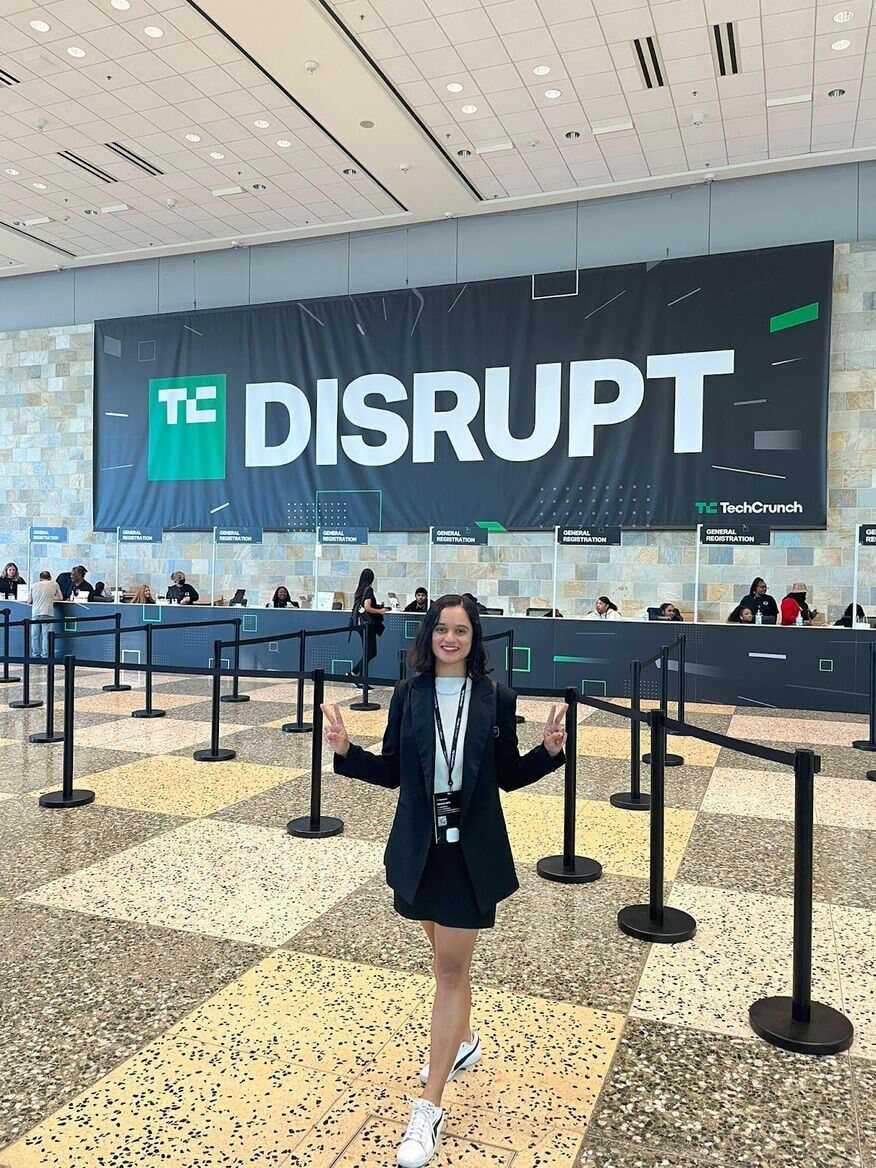TechCrunch Disrupt Learnings

TechCrunch Disrupt is one of the most renowned events in the tech industry, where startups, investors, and tech enthusiasts converge to discuss cutting-edge innovations and trends. It’s a goldmine of insights for those in tech fields, like AI and data science, and anyone looking to stay relevant in this fast-paced industry.
I had the unique opportunity to interview my sister, Madhuvanthi Venkatesh, after she attended TechCrunch Disrupt 2024 in Silicon Valley. As a data scientist and an AI meetup organizer, Madhu’s insights from the event are invaluable for aspiring tech professionals and startup enthusiasts alike. This blog captures the highlights of our conversation, including her key takeaways and actionable advice for building skills, networking, and staying ahead in the AI space.
Feedback quarterly will build a quick feedback loop. Prepare the list of your career goals and ask what could be X, Y and Z to achieve them. Keep a bigger picture in your head - where do you want to be by the end of the year, in the next 5 years?
Sahana: Hi, Madhu! Thanks for joining. Could you start by telling me a bit about yourself and your background?
Madhu: Thanks, Sahana! My name is Madhuvanthi, but feel free to call me Madhu. I’m based in Frankfurt, Germany, where I work as a data scientist and data engineering consultant at CGI. I’m also a big tech enthusiast and even organize AI meetups in Frankfurt as a hobby. To sum it up, I’m passionate about data, AI, and networking!
Sahana: That’s awesome! Could you tell me more about TechCrunch Disrupt and the kinds of people who attend?
Madhu: Sure! TechCrunch is a major online publication that covers high-tech and startup news. They host TechCrunch Disrupt every year in cities across the U.S. and Europe. I went to the one in Silicon Valley in October 2024, and I was surprised to see such a diverse crowd—investors, founders, and talented people from all over, including Korea, Japan, and India. It’s a great place to network, promote startups, find investors, and pick up new skills.
Sahana: Nice! What were your top three takeaways from attending?
Madhu: First, attending helped me evaluate myself and appreciate the value of these kinds of conferences. Second, I realized how far behind Europe is, especially Germany, in the AI race compared to Silicon Valley. There were so many "tiny LLM" startups that we just don’t see as much of here. Lastly, I loved how many companies prioritize real networking over digital marketing. They’re building meaningful connections, which feels refreshing. And one lasting lesson for me was the importance of being bold—everyone was so confident about sharing their ideas on a big stage. As someone who dreams of having a startup one day, that was inspiring!
Sahana: Fascinating! You mentioned a knowledge gap between Europe and Silicon Valley. Could you share more about the advancements you saw?
Madhu: Definitely. I learned about tiny language models that run efficiently on advanced hardware. Tony Fadell (the founder of Nest, which was acquired by Google) and Roeland Nusselder (CEO of Plumerai, a promising London startup) talked about using tiny models in security cameras. Imagine searching for a specific person or object in video footage through a chatbot—that’s the kind of thing these tiny models enable. They’re seen as the future of AI. Another major focus was cost management in real-time data pipelines, which is a real challenge for data engineers like me.
Sahana: Wow! In your opinion, what skill gaps should people focus on to stay relevant?
Madhu: There’s definitely a gap in Europe, especially in areas like GenAI and real-time data applications. To bridge this, practical experience is key—attending conferences, working with experts, or joining hackathons is way more effective than just taking online courses.
Sahana: Great advice! It’s inspiring how you put yourself out there to connect with experts. What should people keep in mind when reaching out to speakers at events?
Madhu: One tip I picked up is to take notes during their talks and then send personalized LinkedIn requests mentioning specific things that resonated with you. It makes you stand out and helps create a real connection. After the event, I’d recommend posting about what you learned on LinkedIn. It helps keep you on their radar and makes the connection more meaningful.
Sahana: That’s really helpful advice. Finally, any tips for building confidence when surrounded by experts?
Madhu: It can be intimidating, but it’s important to trust in your own knowledge and unique insights. At TechCrunch Disrupt, speakers encouraged us to be authentic and comfortable in our own skin as a way to overcome imposter syndrome. One of my favorite takeaways was, “Whenever given the choice, bet on yourself.”
Madhuvanthi Venkatesh is a Lead Consultant at CGI and the organizer of AI Meetup Frankfurt. Madhuvanthi Details : LinkedIn
